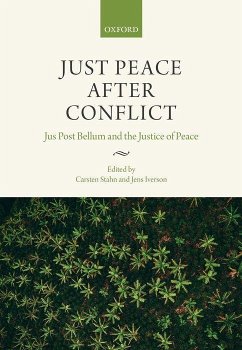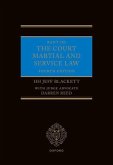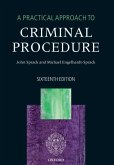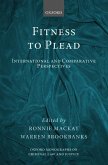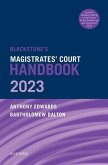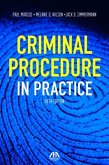Just Peace After Conflict
Jus Post Bellum and the Justice of Peace
Herausgeber: Stahn, Carsten; Iverson, Jens
Just Peace After Conflict
Jus Post Bellum and the Justice of Peace
Herausgeber: Stahn, Carsten; Iverson, Jens
- Gebundenes Buch
- Merkliste
- Auf die Merkliste
- Bewerten Bewerten
- Teilen
- Produkt teilen
- Produkterinnerung
- Produkterinnerung
Opinions over the nature of a 'just peace' are divided. In this third output of a major research project on Jus Post Bellum, Stahn, Iverson, and Easterday bring together a team of experts to argue that a just peace is not only related to form and process, but involves 'substantive' justice: a just order, a secure peace, and societal acceptance.
Andere Kunden interessierten sich auch für
![Rant on the Court Martial and Service Law Rant on the Court Martial and Service Law]() Jeff BlackettRant on the Court Martial and Service Law366,99 €
Jeff BlackettRant on the Court Martial and Service Law366,99 €![A Practical Approach to Criminal Procedure A Practical Approach to Criminal Procedure]() John Sprack (Barrister, formerly Reader, Inns of Court Law School,A Practical Approach to Criminal Procedure101,99 €
John Sprack (Barrister, formerly Reader, Inns of Court Law School,A Practical Approach to Criminal Procedure101,99 €![Fitness to Plead Fitness to Plead]() Fitness to Plead122,99 €
Fitness to Plead122,99 €![Blackstone's Magistrates' Court Handbook 2023 Blackstone's Magistrates' Court Handbook 2023]() Bartholomew DaltonBlackstone's Magistrates' Court Handbook 202389,99 €
Bartholomew DaltonBlackstone's Magistrates' Court Handbook 202389,99 €![Still Doing Life Still Doing Life]() Howard ZehrStill Doing Life25,99 €
Howard ZehrStill Doing Life25,99 €![You Might Go to Prison, Even Though You're Innocent You Might Go to Prison, Even Though You're Innocent]() Justin BrooksYou Might Go to Prison, Even Though You're Innocent25,99 €
Justin BrooksYou Might Go to Prison, Even Though You're Innocent25,99 €![Criminal Procedure in Practice Criminal Procedure in Practice]() Jack B ZimmermannCriminal Procedure in Practice89,99 €
Jack B ZimmermannCriminal Procedure in Practice89,99 €-
-
-
Opinions over the nature of a 'just peace' are divided. In this third output of a major research project on Jus Post Bellum, Stahn, Iverson, and Easterday bring together a team of experts to argue that a just peace is not only related to form and process, but involves 'substantive' justice: a just order, a secure peace, and societal acceptance.
Produktdetails
- Produktdetails
- Verlag: Oxford University Press
- Seitenzahl: 382
- Erscheinungstermin: 5. November 2020
- Englisch
- Abmessung: 246mm x 173mm x 30mm
- Gewicht: 906g
- ISBN-13: 9780198823285
- ISBN-10: 0198823282
- Artikelnr.: 53167417
- Verlag: Oxford University Press
- Seitenzahl: 382
- Erscheinungstermin: 5. November 2020
- Englisch
- Abmessung: 246mm x 173mm x 30mm
- Gewicht: 906g
- ISBN-13: 9780198823285
- ISBN-10: 0198823282
- Artikelnr.: 53167417
Carsten Stahn is Professor of International Criminal Law and Global Justice at Leiden University and is Professor of Public International Law and International Criminal Justice at Queen's University Belfast School of Law. He has previously worked as Legal Officer in Chambers of the International Criminal Court (2003-2007) and as Research Fellow at the Max Planck Institute for Comparative Public Law and International Law (2000-2003). He obtained his PhD degree (summa cum laude) from Humboldt University Berlin after completing his First and Second State Exam in Law in Germany. He holds LL.M. degrees from New York University and Cologne/Paris I (Panthéon-Sorbonne). He has published 13 books and over 70 articles/essays in different fields of international law and international justice. He is Editor of the Leiden Journal of International Law and Correspondent of the Netherlands International Law Review. Jens Iverson is Assistant Professor of Public International Law at the Grotius Centre for International Legal Studies, Leiden Law School. A member of the California Bar, the Thurston Society, and the Order of the Coif, he received his Juris Doctor cum laude from the University of California, Hastings, and his Bachelor of Arts from Yale University. He has worked with the Cambodian Genocide Program, the Documentation Centre of Cambodia, and the Coalition for the International Criminal Court. As the co-founder of a human rights clinic, he helped represent the former Prime Minister of Haiti in a successful petition to the Inter-American Commission on Human Rights that ultimately resulted in a landmark ruling requiring Haitian prison reform. He has practiced at the International Criminal Tribunal for the former Yugoslavia on both the Popovic et al and Prlic et al cases.
* 1. Jus Post Bellum and Just Peace: An Introduction, Carsten Stahn
* PART I: JUS POST BELLUM AND CONCEPTIONS OF PEACE
* 2. Roots and Branches: The Past and Future of Jus Post Bellum, Brian
Orend
* 3. A Just and Lasting Peace After War, Lonneke Peperkamp
* 4. Parameters of Sustainable Peace: UN Frameworks and Practice,
Martin Wählisch
* PART II: MACRO PRINCIPLES
* 5. Jus Post Bellum and Proportionality, Michael A. Newton
* 6. Reconciliation and a Just Peace, James Gallen
* 7. Jus Post Bellum and the Evolution of Reparations: Reframing
Reparations as Peace Building, Cymie R. Payne
* 8. Mapping a Norm of Inclusion in the Jus Post Bellum, Catherine
Turner
* PART III: SECURITY AND STABILITY
* 9. Legal Protection of the Environment: The Double Challenge of
Non-International Armed Conflict and Post-Conflict Peacebuilding, ,
Dieter Fleck
* 10. Robust Peacekeeping Mandates: An Assessment in Light of Jus Post
Bellum, Marco Longobardo
* 11. Power Shift: Assessing the Role of Mediators on the Jus Post
Bellum, Patrick Wall
* PART IV : PROTECTION OF PERSONS AND PUBLIC GOODS
* 12. Rights of Indigenous Peoples and Environmental Protection in Jus
Post Bellum, Britta Sjöstedt
* 13. The Jus Post Bellum of Illegally Transferred Settler Populations,
Eugene Kontorovich
* 14. Right to Land, Housing, and Property, Elisenda Calvet Martinez
and Aitor Diaz Anabitarte
* PART V: RULE OF LAW REFORM AND ECONOMIC REFORM
* 15. Jus Post Bellum as Definition and Practice, Maj Grasten
* 16. Vetting: The Way to Prevent Recurrence?, Alexander Mayer-Rieckh
* 17. Norm Persistence in Distributive Justice: Labour Rights, Michael
Pugh
* PART VI : ACCOUNTABILITY
* 18. The Long Tail of World War II: Jus Post Bellum in Contemporary
East Asia,Timothy Webster
* 19. Inclusion, Justice, and Peace in Colombia, Jennifer Easterday
* PART I: JUS POST BELLUM AND CONCEPTIONS OF PEACE
* 2. Roots and Branches: The Past and Future of Jus Post Bellum, Brian
Orend
* 3. A Just and Lasting Peace After War, Lonneke Peperkamp
* 4. Parameters of Sustainable Peace: UN Frameworks and Practice,
Martin Wählisch
* PART II: MACRO PRINCIPLES
* 5. Jus Post Bellum and Proportionality, Michael A. Newton
* 6. Reconciliation and a Just Peace, James Gallen
* 7. Jus Post Bellum and the Evolution of Reparations: Reframing
Reparations as Peace Building, Cymie R. Payne
* 8. Mapping a Norm of Inclusion in the Jus Post Bellum, Catherine
Turner
* PART III: SECURITY AND STABILITY
* 9. Legal Protection of the Environment: The Double Challenge of
Non-International Armed Conflict and Post-Conflict Peacebuilding, ,
Dieter Fleck
* 10. Robust Peacekeeping Mandates: An Assessment in Light of Jus Post
Bellum, Marco Longobardo
* 11. Power Shift: Assessing the Role of Mediators on the Jus Post
Bellum, Patrick Wall
* PART IV : PROTECTION OF PERSONS AND PUBLIC GOODS
* 12. Rights of Indigenous Peoples and Environmental Protection in Jus
Post Bellum, Britta Sjöstedt
* 13. The Jus Post Bellum of Illegally Transferred Settler Populations,
Eugene Kontorovich
* 14. Right to Land, Housing, and Property, Elisenda Calvet Martinez
and Aitor Diaz Anabitarte
* PART V: RULE OF LAW REFORM AND ECONOMIC REFORM
* 15. Jus Post Bellum as Definition and Practice, Maj Grasten
* 16. Vetting: The Way to Prevent Recurrence?, Alexander Mayer-Rieckh
* 17. Norm Persistence in Distributive Justice: Labour Rights, Michael
Pugh
* PART VI : ACCOUNTABILITY
* 18. The Long Tail of World War II: Jus Post Bellum in Contemporary
East Asia,Timothy Webster
* 19. Inclusion, Justice, and Peace in Colombia, Jennifer Easterday
* 1. Jus Post Bellum and Just Peace: An Introduction, Carsten Stahn
* PART I: JUS POST BELLUM AND CONCEPTIONS OF PEACE
* 2. Roots and Branches: The Past and Future of Jus Post Bellum, Brian
Orend
* 3. A Just and Lasting Peace After War, Lonneke Peperkamp
* 4. Parameters of Sustainable Peace: UN Frameworks and Practice,
Martin Wählisch
* PART II: MACRO PRINCIPLES
* 5. Jus Post Bellum and Proportionality, Michael A. Newton
* 6. Reconciliation and a Just Peace, James Gallen
* 7. Jus Post Bellum and the Evolution of Reparations: Reframing
Reparations as Peace Building, Cymie R. Payne
* 8. Mapping a Norm of Inclusion in the Jus Post Bellum, Catherine
Turner
* PART III: SECURITY AND STABILITY
* 9. Legal Protection of the Environment: The Double Challenge of
Non-International Armed Conflict and Post-Conflict Peacebuilding, ,
Dieter Fleck
* 10. Robust Peacekeeping Mandates: An Assessment in Light of Jus Post
Bellum, Marco Longobardo
* 11. Power Shift: Assessing the Role of Mediators on the Jus Post
Bellum, Patrick Wall
* PART IV : PROTECTION OF PERSONS AND PUBLIC GOODS
* 12. Rights of Indigenous Peoples and Environmental Protection in Jus
Post Bellum, Britta Sjöstedt
* 13. The Jus Post Bellum of Illegally Transferred Settler Populations,
Eugene Kontorovich
* 14. Right to Land, Housing, and Property, Elisenda Calvet Martinez
and Aitor Diaz Anabitarte
* PART V: RULE OF LAW REFORM AND ECONOMIC REFORM
* 15. Jus Post Bellum as Definition and Practice, Maj Grasten
* 16. Vetting: The Way to Prevent Recurrence?, Alexander Mayer-Rieckh
* 17. Norm Persistence in Distributive Justice: Labour Rights, Michael
Pugh
* PART VI : ACCOUNTABILITY
* 18. The Long Tail of World War II: Jus Post Bellum in Contemporary
East Asia,Timothy Webster
* 19. Inclusion, Justice, and Peace in Colombia, Jennifer Easterday
* PART I: JUS POST BELLUM AND CONCEPTIONS OF PEACE
* 2. Roots and Branches: The Past and Future of Jus Post Bellum, Brian
Orend
* 3. A Just and Lasting Peace After War, Lonneke Peperkamp
* 4. Parameters of Sustainable Peace: UN Frameworks and Practice,
Martin Wählisch
* PART II: MACRO PRINCIPLES
* 5. Jus Post Bellum and Proportionality, Michael A. Newton
* 6. Reconciliation and a Just Peace, James Gallen
* 7. Jus Post Bellum and the Evolution of Reparations: Reframing
Reparations as Peace Building, Cymie R. Payne
* 8. Mapping a Norm of Inclusion in the Jus Post Bellum, Catherine
Turner
* PART III: SECURITY AND STABILITY
* 9. Legal Protection of the Environment: The Double Challenge of
Non-International Armed Conflict and Post-Conflict Peacebuilding, ,
Dieter Fleck
* 10. Robust Peacekeeping Mandates: An Assessment in Light of Jus Post
Bellum, Marco Longobardo
* 11. Power Shift: Assessing the Role of Mediators on the Jus Post
Bellum, Patrick Wall
* PART IV : PROTECTION OF PERSONS AND PUBLIC GOODS
* 12. Rights of Indigenous Peoples and Environmental Protection in Jus
Post Bellum, Britta Sjöstedt
* 13. The Jus Post Bellum of Illegally Transferred Settler Populations,
Eugene Kontorovich
* 14. Right to Land, Housing, and Property, Elisenda Calvet Martinez
and Aitor Diaz Anabitarte
* PART V: RULE OF LAW REFORM AND ECONOMIC REFORM
* 15. Jus Post Bellum as Definition and Practice, Maj Grasten
* 16. Vetting: The Way to Prevent Recurrence?, Alexander Mayer-Rieckh
* 17. Norm Persistence in Distributive Justice: Labour Rights, Michael
Pugh
* PART VI : ACCOUNTABILITY
* 18. The Long Tail of World War II: Jus Post Bellum in Contemporary
East Asia,Timothy Webster
* 19. Inclusion, Justice, and Peace in Colombia, Jennifer Easterday

